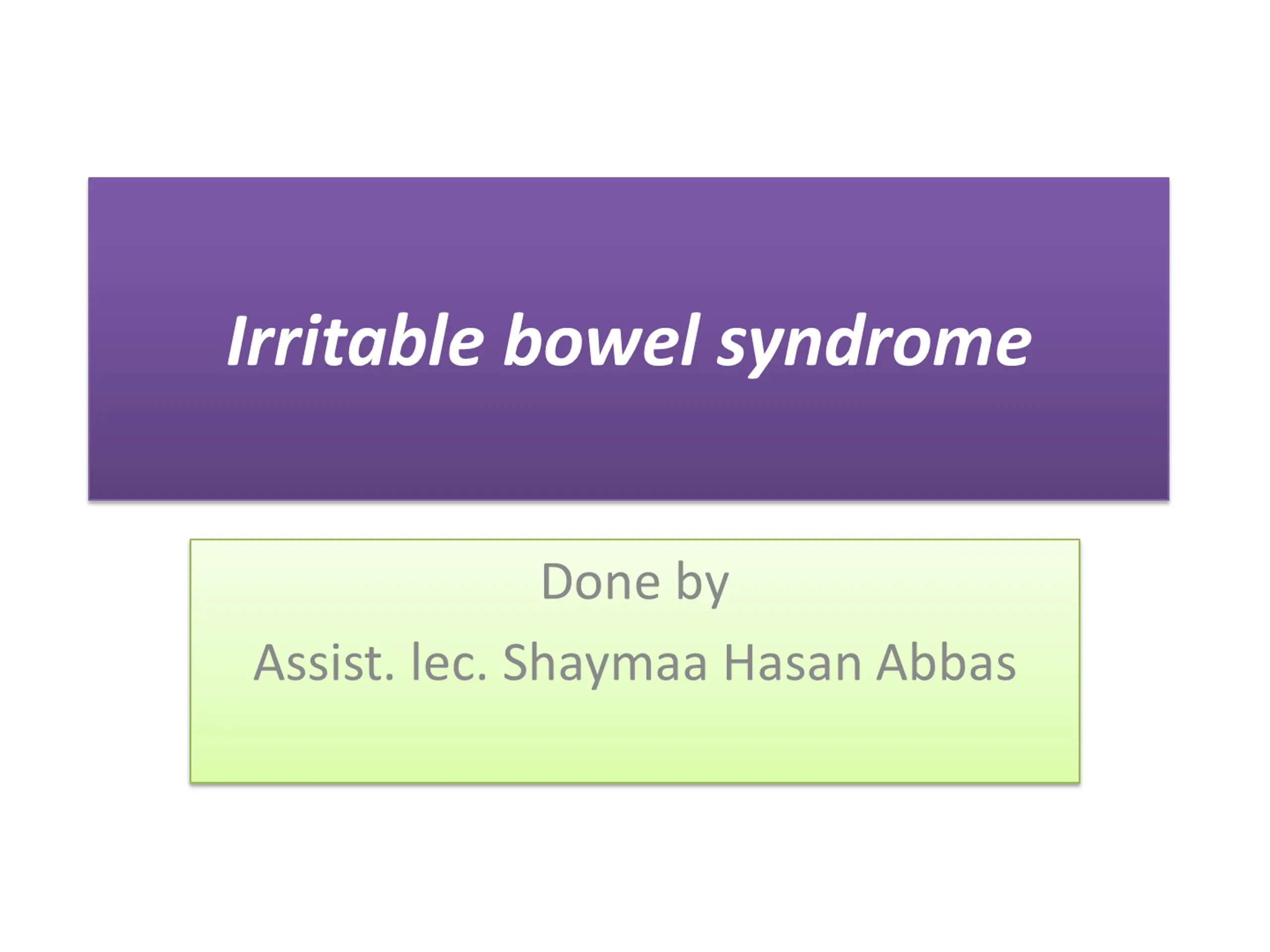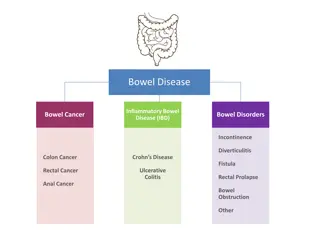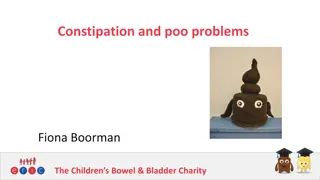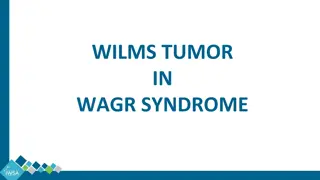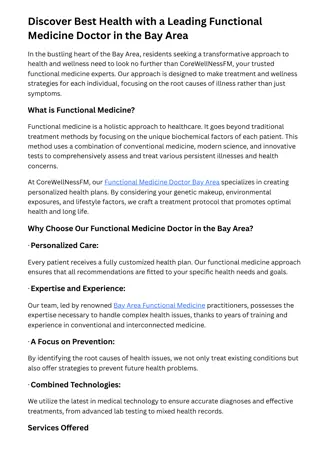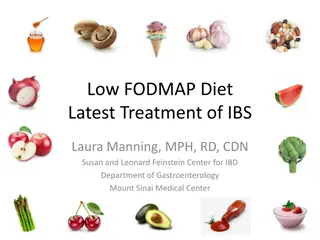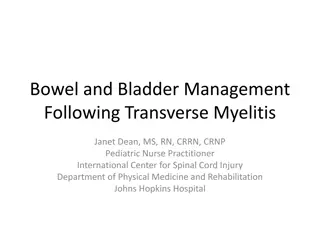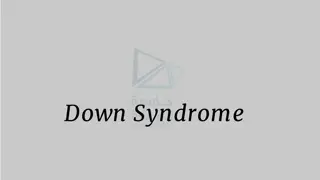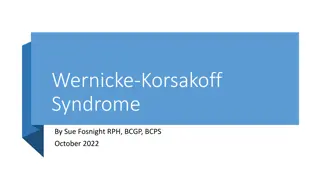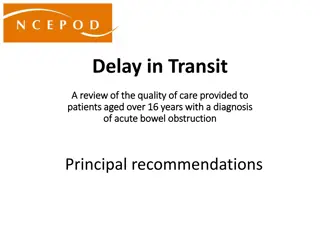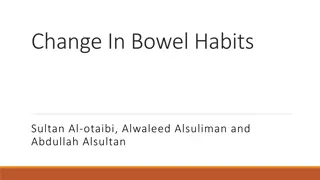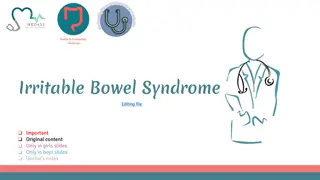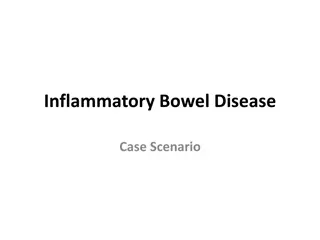Irritable bowel syndrome
Information on the aims of treatment, aggravating factors, treatment timescale, and non-drug and drug treatment options for irritable bowel syndrome (IBS). It also includes a list of relevant medications and their effects.
Download Presentation

Please find below an Image/Link to download the presentation.
The content on the website is provided AS IS for your information and personal use only. It may not be sold, licensed, or shared on other websites without obtaining consent from the author.If you encounter any issues during the download, it is possible that the publisher has removed the file from their server.
You are allowed to download the files provided on this website for personal or commercial use, subject to the condition that they are used lawfully. All files are the property of their respective owners.
The content on the website is provided AS IS for your information and personal use only. It may not be sold, licensed, or shared on other websites without obtaining consent from the author.
E N D
Presentation Transcript
Irritable bowel syndrome Done by Assist. lec. Shaymaa Hasan Abbas
Aims of treatment The treatment of IBS is focused on symptom control, in order to improve quality of life
Aggravating factors Stress can precipitate and exacerbate symptoms. Caffeine often worsens symptoms and its stimulant effect on the bowel and irritant effect on the stomach are well known in any case. The sweeteners sorbitol and fructose aggravate IBS. Other foods that have been implicated are milk and dairy products, chocolate, onions, garlic, chives and leeks.
Treatment timescale Symptoms should start to improve within 1 week.
Non-drug treatment Diet Fluid lifestyle changes
Drug treatment 1- Antispasmodics - Anti muscarinic Dicycloverine HCL Tertiory amines atropine sulfate Quaternary ammonium coupounds Hyocine butylbromide Other Antispasmodics Alverine citrate mebeverine hydrochloride peppermint oil
Drug treatment continue 2- Laxatives 3- Anti motility drugs 4- Tricyclic antidepressant (e.g. amitriptyline (HCL) 5- Selective serotonin reuptake inhibitor (SSRI)
Isopropamide is an inherently long-acting synthetic anticholinergic agent that provides 12- hour antisecretory-antispasmodic activity. Trifluoperazine is a piperazine phenothiazine derivative with antipsychotic, anxity, and antiemetic properties. The mode of action of phenothiazines has not been definitely established. Like most phenothiazines, trifluoperazine possesses weak anticholinergic and possibly alpha-adrenergic blocking activities.
Since both components of Stelabid are inherently long-acting, a single tablet twice daily (every 12 hours) can provide continuous 24-hour control of symptoms of ulcer and other gastrointestinal disorders Stelabid is particularly indicated where anxiety, tension, worry, or other emotional factors are thought to be wholly or partially responsible for the digestive dysfunction.
Contra-Indications: In comatose states glaucoma, cardiospasm, obstructive uropathy (e.g., bladder neck obstruction due to prostatic hypertrophy) or obstructive lesions of the gastrointestinal tract (as in achalasia, obstructive or paralytic ileus, pyloroduodenal stenosis, etc.), intestinal atony of the elderly or debilitated patient, severe ulcerative colitis, toxic megacolon complicating ulcerative colitis.
Adverse Reactions: anticholinergic side effects Iodine skin rash may occur rarely.
caution in elderly patients, in patients with cardiac impairment, hyperthyroidism, or hiatal hernia associated with reflux esophagitis (anticholinergic drugs may aggravate this condition). patients with impaired cardiovascular function. angina
Pregnancy and Lactation: Use during pregnancy should be restricted to those cases where the potential benefit to the mother outweighs the potential risk to the fetus. Adequate human data on use during lactation and adequate animal reproduction studies are not available
Librax Librax is a capsule containing a combination of chlordiazepoxide and clidinium bromide . Chlordiazepoxide is a benzodiazepine Clidinium reduces stomach acid and decreases intestinal spasms. Librax is usually taken before meals and at bedtime
Librax is a medicine that may be effective in treating stomach ulcers, irritable bowel syndrome, or symptoms related to intestinal infection. Caution: glaucoma, enlarged prostate, bladder obstruction, or problems with urination Do not drink alcohol while taking Librax. This medication can increase the effects of alcohol. The sedative effects of may last longer in older adults. Accidental falls are common in elderly patients who take benzodiazepines
side effects: ataxia, amnesia, drowsenes, dependance, may impair thinking and reactions. Pregnancy: Librax can cause birth defects in an unborn baby. Do not use this medicine if you are pregnant. Lactation: may decrease breast milk production, manufacture advice avoide
Gastro-oesophageal reflux disease
Precipitating or aggravating factors. Diagnosis of GERD can be helped greatly by asking about the Precipitating factors. These are: A-Bending or lying down(e.g. at night). B- Overweight. C- After large meal. D- Pregnancy(mechanical and hormonal influence). E -It can be aggravated or even caused by belching.
Management A-Non-pharmacoIogical advices: 1-Eat small and frequent meals( to avoid distending the stomach). 2-Do not eat within 3 hours of going to bed and do not lie down for about 3 hours after eating. 3-Use extra pillow to elevate the head of the bed. 4-Do not wear tight fitting clothing. 5-Avoid smoking , alcohol, caffeine and foods that exacerbate symptoms of GERD. 6-Weight reduction should be advised.
Management continue B-pharmacological therapy Antacids: (AL salts, Mg salts, Ca-carbonate, Na- bicarbonate,...):
Management continue Alginates Alginate-containing Antacids form a sponge -like matrix that float on the top of the stomach contents, so when reflux occurs , alginate rather than acids will be refluxed ands irritation is minimized.
Practical points: 1- They are best given after each main meal and before bedtime, although they can be taken on as needed basis. 2-Tablets must be chewed and followed by a full glass of water so that foam can float on water in the stomach. 3-Alginate work when the patient in the upright position and , therefore, must not be taken just before lying down. 4-they can be given in pregnancy.
Management continue Proton pump inhibitors (omprazole cap)
Proton pump inhibitors omeprazole 10 mg is now available for sale over the counter for heartburn sufferers (18 years or over) who experience intermittent and relapsing symptoms. The initial starting dose is 20mg once daily and may need to be taken for 3 to 4 days to obtain symptom relief. Patients requiring immediate symptomatic relief can be advised to take a simple antacid or antacid/alginate at the same time for the first few days of treatment if necessary.
Management continue Histamine 2 receptor antagonists (H2RA):
Histamine 2 receptor antagonists OTC use of H2RA is restricted to adults and children over the age of 16 years Patient can take 1 tablet when symptoms occur, but when food is known to precipitate symptoms, H2RA should be taken an hour before food. OTC use of H2RA is restricted for short -time use only ( not more than 2 weeks)
